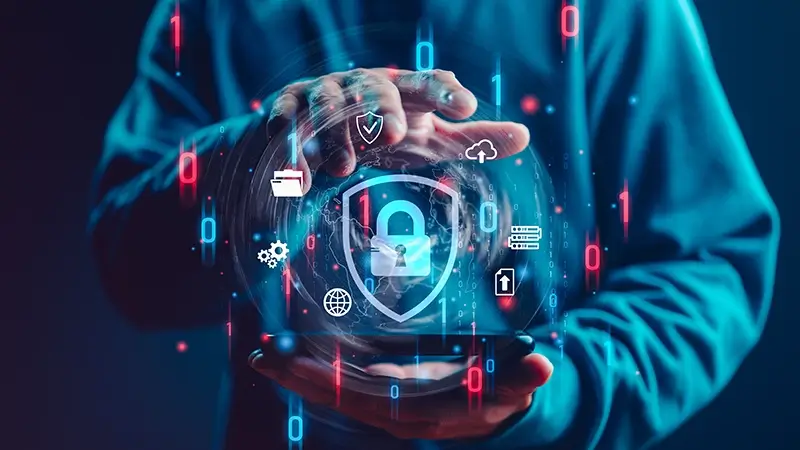In the digital era of constant changes and technological innovations, the term "cybersecurity" has become omnipresent, but not everyone fully understands its scope and true importance regarding digital security.
In the dynamic digital age we live in, cybersecurity has become a fundamental topic that affects everyone equally: individuals, businesses of any size, and governments.
In this blog post, we will delve into the digital world and reality of cybersecurity to understand what it is, why it is crucial, and how it impacts daily life.
Definition of Cybersecurity:
Cybersecurity is a multidisciplinary field dedicated to protecting systems, networks, and data against digital threats. Its main goal is to ensure the confidentiality, integrity, and availability of information in cyberspace to meet online security requirements.
To simplify and have a clearer conception of cybersecurity, it refers to the defense of digital information and data, all devices, and assets against attacks, damage, or unauthorized access.
Pillars of Cybersecurity:
- Confidentiality:
Ensures that sensitive information is protected against unauthorized and harmful access. Techniques such as data encryption and access management ensure that only those with appropriate and authorized permissions can access confidential and private information.
- Integrity:
Maintaining the integrity of all data is essential to ensure that information is not altered in a dangerous or unauthorized manner. Through the use of measures such as digital signatures and early intrusion detection systems, cybersecurity works to prevent and detect unwanted changes in data that can harm and interfere with the privacy of individuals, businesses, and governments.
- Availability:
Refers to ensuring that necessary systems and data are available when needed. Cybersecurity addresses threats such as Denial of Service (DDoS) attacks that could render services or networks inoperable.
Current Threats and Challenges:
- Advanced Persistent Threats (APTs):
APTs are highly sophisticated and targeted attacks, often backed by state actors, that can go undetected for long periods. Cybersecurity must constantly evolve to face these threats.
- Malware:
Malware is malicious software, one of the most common cybersecurity threats in the digital world. It is software created to cause harm to a user's computer or device.
- Types of Malware to be cautious of:
Viruses: Spread throughout the entire computer system by infecting healthy files with malicious code.
Trojans: Deceive users into loading or downloading them onto their devices to gather information or cause harm.
Spyware: Records everything the user is doing on their device for later use of that data.
Ransomware: Encrypts user files and demands a ransom for their release or confidential information.
Botnets: Networks of infected computers allowing online tasks to be performed without the user's consent or knowledge.
Phishing attacks use social engineering tactics like fraudulent messages to deceive users and obtain confidential and private information such as passwords, data, or financial information. Constant awareness and education are crucial to counteract this type of threat.
discover more about Cybersecurity
Types of Cybersecurity:
There are various types of cybersecurity depending on the types of digital systems, networks, and more.
- Network Security:
Protection for different devices and devices that would be connected to a network. Network security technologies such as firewalls and access control are commonly used to regulate and manage digital resources.
- Cloud Security:
Measures and actions taken by an organization to safeguard data and applications running in the cloud. It is essential to maintain customer trust through protection and compliance with data privacy regulations in a likely scalable environment. Security must be from both sides, the organization, and the service provider.
- Data Security:
Protection of all data in transit and at rest within a secure data storage and transfer system. Through encryption and isolated backups to be prepared for possible attacks.
The Importance of Cybersecurity:
The growing dependence and daily use of technology and connectivity have elevated the importance of cybersecurity. A successful attack can have serious consequences ranging from the loss of critical and valuable data to compromising individual or group privacy. Additionally, trust in the digital economy and online transactions largely depends on cybersecurity expertise.
In addition to protecting against threats, cybersecurity offers protection and safeguards against potential data or information loss or theft.
Security software analyzes end-users' computers to identify malicious code that can enter and cause harm. When identified, it is quarantined and removed from the computer.
The importance and essence of these security protocols lie in users' ability to use them and with constant updates to be protected from cybersecurity attacks.
Everyone's Role in Cybersecurity:
Cybersecurity is not only the responsibility of technology experts. Every user plays a crucial role in maintaining digital security. From choosing strong passwords to being alert to suspicious emails, every action contributes to comprehensive protection.
If proper security practices are not followed, any user can unwittingly introduce a virus or malware into the system. Constant education and teaching about what to do and what not to do help users delete potentially malicious files in emails, avoid inserting unidentified USBs, and many more lessons to protect the data and information of individuals, businesses, or governments.
The Future of Cybersecurity:
As technology advances, cybersecurity tries to evolve in parallel to face new threats. Artificial intelligence and machine learning are used to improve the detection of anomalous patterns, and global collaboration becomes essential to address cross-border cyber threats.
Conclusion:
In an increasingly digitized world, cybersecurity is essential to protect all digital assets and preserve trust in cyberspace. It has ceased to be an option and has become a necessity. From individual users to large corporations, everyone is responsible for contributing to a safer digital environment by understanding basic principles and current threats.
Contact StarkCloud for advice and ensure all your data is protected!




